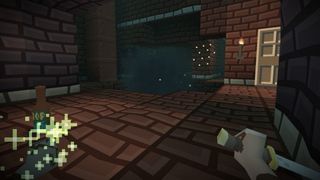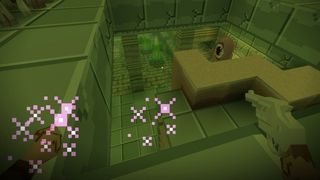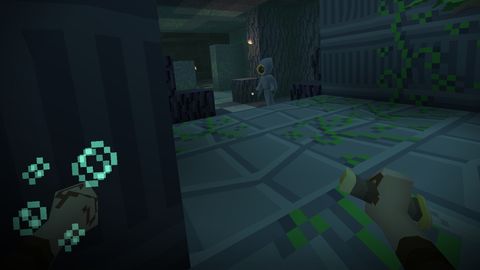Our Verdict
An accomplished Lovecraftian adventure with a bunch of potential that gives up its deeper secrets too easily.
PC Gamer's got your back
As I approached the end of my first run through Eldritch I was more or less unstoppable. I'd bought stealth boots from the desert realm of Nyarlathotep, allowing me to sprint silently from cover to jam my dagger into the face of whatever adorable cosmic horror awaited me in the next chamber. I held a talisman that enabled my revolver to blow away the game's randomly-generated environments brick by brick. When my progress was blocked by a locked door I'd blast a hole in the wall instead, and where I couldn't find a safe route down to the next level of Lovecraftian dungeon, I'd make one.
In my left hand, I carried a cloaking spell. Eldritch's designer, David Pittman, worked on BioShock 2 - and something of that game's array of magic powers and gadgets is reflected here. Other spells include hypnosis, teleportation, and the ability to create blocks to build walls and staircases - but cloaking was my catch-all problem-solver, my get-out-of-R'lyeh-free card.
Eldritch is a first-person, voxel-based indie roguelike. You begin as a '20s-styled adventurer trapped in a twisting library, forced to hunt the souls of Great Old Ones within the pages of ancient books. This means visiting the undersea realm of Dagon, Nyarlathotep's Egyptian-themed temple, and deeper, stranger places beyond that. When you die you're returned to the library with your equipment and upgrades gone, but you retain any currency that you've stored in your bank chest, and any zones you've unlocked stay that way.

With the right upgrades, however, even death may die. The final tool in my arsenal was a medical kit that enabled me to revive myself where I fell, for a price. Approaching the game's final area I raided the bank and waded in with enough for four free respawns - and that's in addition to my invisibility spell, my silent shoes, and my revolver that blows holes in the world.
Lovecraft's own heroes were never so lucky - and I've never beaten a roguelike on my first go. But so it was with Eldritch.
The game's low difficulty is a real thorn in its side, because there's tremendous promise here. The low-fi visuals belie a surprising freedom of movement. You can lean, mantle, slide and leap in a way that makes the game feel like Dishonored circa 1995. It owes a debt to the exploration-heavy shooters of that era, too - games like Hexen and Duke Nukem 3D that rewarded spatial awareness and attention to detail with secret caches of health and ammo. Then there's the influence of Rogue itself, evident in the way the minimap fills in square by square, layer by layer, as you peel away at each new environment.
A few brilliantly-designed enemies make the Nyarlathotep stages the best in the game. There are ghoulish wanderers that can't be killed - only postponed - and an enemy whose killer chameleon act delivers this otherwise-cartoonish game's premier jump scares. Later on there are implacable shoggoths that look like a binbag caught in a gale but hit like a binbag caught in the grille of an oncoming truck. Coming up with solutions to these problems - making your own routes, evading enemies, tactically reconfiguring the environment - is satisfying. It's just that serious threats are too scarce, and therefore the end arrives far sooner than it should.
Then you unlock New Game Plus.

New Game Plus feels like the real secret lurking at the end of Eldritch. Completing the game adds a new pedestal to the library, along with a new soul to collect - the Soul of the Librarian. Picking this up at the beginning of a run makes the game harder in a wide variety of ways.
A compass will no longer spawn next to the entrance to the first ruin. Enemies are faster, and hit harder, and tougher foes - those damn shoggoths - spawn from the very beginning of the game. Traps are more numerous, and health-replenishing fountains far less so. You've also seen your last cache of free revolvers.
These changes peel away Eldritch's soft fleshy exterior and expose the raw nerve beneath. I might have beaten the entire game in a single sitting on regular difficulty, but I struggle to crack the first Dagon ruin now. Sneaking and using the lean buttons to peek around corners becomes more important, and resource conservation forces you to weigh the benefit of casting a spell against a potential upgrade purchase later on. I've learned the right way to bypass spike nests and discovered - to my genuine horror - that shoggoths can squeeze through narrow entryways.
Hurtling through a ruin being pursued by a tentacled pan-dimensional binbag is exactly the experience I wanted from Eldritch - and when that's the way you die, it's an experience worth sharing.
New Game Plus solves so many of my issues with the game that I wish I'd been able to experience it this way the first time around. As it is, I'm excited to press on and try to complete the game again - but I've already seen the vast majority of its environments, monsters and gadgets. The promise of seeing the Temple for the first time kept me plugging away at Spelunky long after I'd butted up against the ceiling of my own ability, and as far as I can tell FTL's final boss is something that only exists in YouTube Let's Plays. Eldritch has already yielded up its secrets, and progress through this harder, all-round better mode is less rewarding as a result. Lovecraft knew that the effectiveness of his stories relied on tightly controlling what his readers knew and when. Eldritch borrows Lovecraft's gods and monsters, but it introduces his world too gently to capitalise on its potential.
- Expect to pay £9.99/$14.99
- Release Out now
- Developer David Pittman
- Publisher Minor Key Games
- Multiplayer Singleplayer only
- Link www.eldritchgame.com
An accomplished Lovecraftian adventure with a bunch of potential that gives up its deeper secrets too easily.
Joining in 2011, Chris made his start with PC Gamer turning beautiful trees into magazines, first as a writer and later as deputy editor. Once PCG's reluctant MMO champion , his discovery of Dota 2 in 2012 led him to much darker, stranger places. In 2015, Chris became the editor of PC Gamer Pro, overseeing our online coverage of competitive gaming and esports. He left in 2017, and can be now found making games and recording the Crate & Crowbar podcast.


